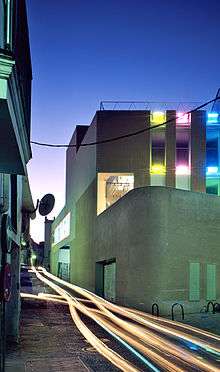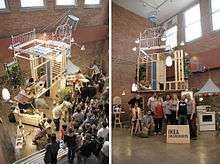Andrés Jaque



Andrés Jaque is an architect. His work explores the role architecture plays in the making of societies. In 2003 he founded the Office for Political Innovation,[1] a trandisciplinary agency working in the making of urban networks.[2] In 2014 he won the Silver Lion to the Best Research Project at the 14th Venice Biennale. In 2016 he was awarded with the 10th Frederick Kiesler Prize, the most respected prize recognizing creators working in the intersection of art and architecture.[3]
Life and career
He is the author of award-winning architectural projects, including the Casa Sacerdotal Diocesana de Plasencia; 2004. Teddy House (Vigo, 2003, 2005), Mousse City, (Stavanger, 2003); Peace Foam City (Ceuta, 2005); Skin Gardens (Barcelona 2006); the Museo Postal de Bogotá (Bogotá, 2007), Rolling House for the Rolling Society (Barcelona, 2009); the House in Never Never Land (Ibiza, 2009); the ESCARAVOX, (Madrid, 2012), Hänsel and Gretel's Arenas (Madrid, 2013), Shading Devices and Gathering Space for Masdar in Abu Dhabi; Weizmann Square in Holon and Cosmo PS1 in New York.
He has also developed a number of architectural experiments meant to interrogate architecture's political agency. The 12 Actions to Make Peter Eisenman Transparent, 2010,[4] a project to make visible, and easy to understand for general public, the political implications of the construction of the singular building site Cidade da Cultura in Santiago de Compostela. A series of actions described by Bruno Latour as a «beautiful mixture of art, politics and building-site».[5]
His 2012 intervention in the Barcelona Pavilion, ‘PHANTOM. Mies as Rendered Society’[6] made visible all the processes involved in the daily fabrication of the pavilion as an ordinary reality. Buckets, flags, chairs, old faded curtains, the salt that keeps the ponds pristine or the result of failed experiments carried out at the pavilion, were kept at the so far unnoticed basement.
His work 'IKEA Disobedients' (Madrid, New York 2012) was the first architectural performance to be included in the MoMA's collection.[7]
Andrés Jaque has been Tessenow Stipendiat and he is currently faculty member at Columbia University GSAPP and Visiting Professor at Princeton University School of Architecture.
Publications
Andrés Jaque and the Office for Political Innovation have made major contributions to conceptualize the implications of French ecology and post-foundational politics for contemporary architectural and urban practices. They are the authors of:
- ‘Andrés Jaque. Everyday Politics’. EA! Ediciones. 2011.[8]
- 'PHANTOM. Mies as Rendered Society'. Fundació Mies van der Rohe 2013.[9]
- ‘Eco-Ordinary. Codes for Quotidian Architectural Practices’. Lampreave Ediciones. 2010.[10]
- ‘Dulces Arenas Cotidianas’. Lugadero. 2013.[11]
- 'Calculable-Transmaterial'. ARQ. 2017.[12]
- 'Different Kinds of Water Pouring Into A Swimming Pool'. RedCat CalArts. 2014 [13]
Jaque has made regular contributions to both specialized and general media. With significant papers for leading architectural magazines such as El Croquis,[14][15] Domus[16] and Beyond;[17] and regular works for broader audiences in media like Babelia, the cultural supplement of El País,[18][19][20] or La SER radio station where Jaque holds a regular participation on architectural and urban concerns. Since 2013 he publishes the periodic column "Cuarto de estar en la galaxia" in El País Semanal and collaborates with El País' cultural supplement, Babelia.
Office for Political Innovation
In 2003 together with a number of sociologist, economist and journalist he created the Office for Political Innovation, an urban lab focused on the development of a democratically centered architecture, considering objects as material actors of equalitarian societies.
References
- ↑ Official website
- ↑ "Architecture as Rendered Socitety. Andrés Jaque in conversation with Ignacio González Galán" (Volume #33 Interiors. Rotterdam 2012)
- ↑ "Andrés Jaque Awarded with the 10th Frederich Kiesler Prize"
- ↑ "12 acciones para transparentar la Cidade da Cultura de Galicia de Peter Eisenman”. Pp.26-29 Pasajes de arquitectura y crítica. n.66 Madrid. Marzo
- ↑ 12 acciones para trasparentar la ciudad de la cultura de Peter Eisenman” Pp.124-137 UR Arquitectura. Buenos Aires, 2007
- ↑ Barahona, Ethel. "The Value of the Infraordinary" (Domus. Milano 2013)
- ↑ IKEA Disobedients. At the MoMA Collection
- ↑ ‘Andrés Jaque. Everyday Politics’. EA! Ediciones. 2011
- ↑ 'PHANTOM. Mies as Rendered Society'. Fundació Mies van der Rohe 2013
- ↑ ‘Eco-Ordinary. Codes for Quotidian Architectural Practices’. Lampreave Ediciones. 2010
- ↑ ‘Dulces Arenas Cotidianas’. Lugadero. 2013 Archived January 31, 2013, at the Wayback Machine.
- ↑ 'Calculable-Transmaterial'. ARQ. 2017 Archived September 6, 2017, at the Wayback Machine.
- ↑ 'Different Kinds of Water Pouring Into a Swimming Pool'. RedCat CalArts. 2014 Archived September 6, 2017, at the Wayback Machine.
- ↑ “Collective Experiments. Video-visits and Tele-conversations in the Times of the Technical Codes” (El Croquis. El Escorial 2011).
- ↑ “Collective Experiments. Interiors, Views and Mutiverses” (El Croquis. El Escorial 2012)
- ↑ “15M. Yes we Camp. Urbanism as Controversy” (Domus. Milano 2011)
- ↑ “Janet Rodriguez’s Parliament” (Beyond. Values and Symptoms. N.2. Rotterdam 2009) Archived December 3, 2013, at the Wayback Machine.
- ↑ “Ecoaldeas frente a la ciudad eléctrica” (Babelia. El País. 06.08.2011)
- ↑ “El arquitecto no es un creador solitario” (Babelia. El País. 25.04.2009)
- ↑ “¿Ciudad contemporánea? Consulte su locutorio” (Babelia. El País. 13.09.2008)
External links
| Wikimedia Commons has media related to Andrés Jaque. |
- Hans Ulrich Obrist interviews Andrés Jaque
- Christopher Hawthorne profiles Andrés Jaque for Architect
- "Architecture as Rendered Society" Andrés Jaque's lecture at Princeton SoA
- IKEA Disobedients at the MoMA Collection
- Baraona, Ethel "The Value of the Onfra Ordinary" (Domus. Milano 2013)
- "Architecture as Rendered Socitety. Andrés Jaque in conversation with Ignacio González Galán" (Volume #33 Interiors. Rotterdam 2012)
- "Andrés Jaque. Everyday Politics". (EA! Editions. 2012)
- Jaque, Andrés "Eco-Ordinary. Codes for Quotidian Architectural Practices" (Lampreave Editions. 2011)
- Jaque, Andrés "Dulces arenas cotidianas" (Lugadero. 2013)
- Jaque, Andrés "Collective Experiments. Video-interviews and Tele-conversations in the time of the technical codes" (El Croquis N.148)
- Jaque, Andrés "Collective Experiments. Interiors, Views and Multiverses" (El Croquis N.149)
- Jaque, Andrés "15M. Yes We Camp. Urbanism as Controversy" (Domus. Milano 2011)
- Jaque, Andrés "Janet Rodríguez's Parliament" (Beyond. Rotterdam 2009)
- Jaque, Andrés "Different Kinds of Water Pouring Into a Swimming Pool" (RedCat CalArts. 2014)
- Jaque, Andrés "Calculable-Transmaterial" (ARQ. 2017)